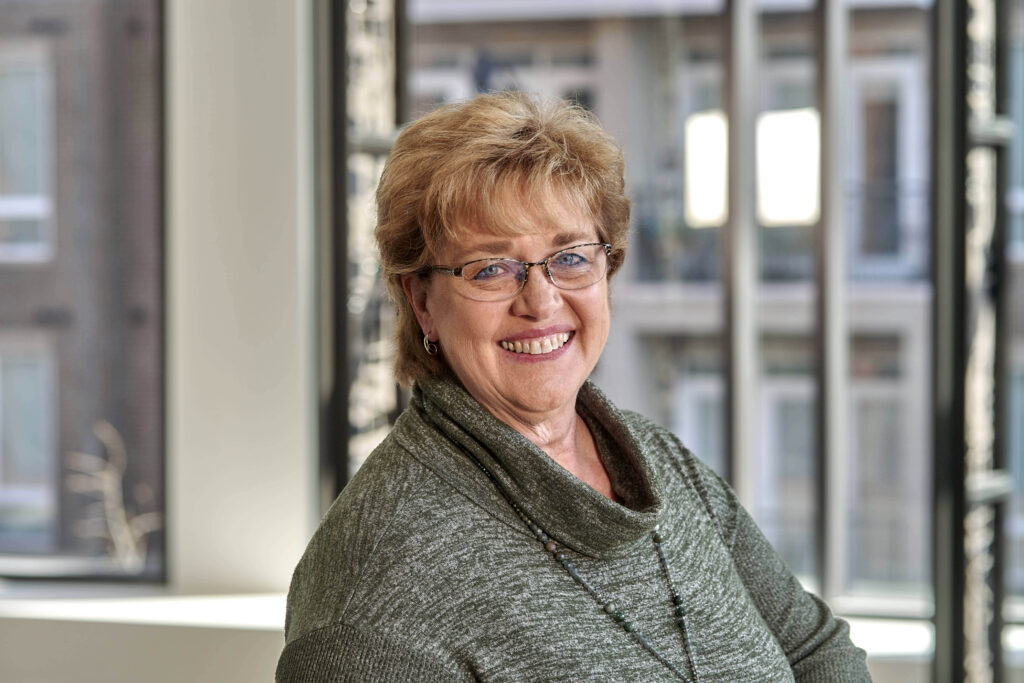We talked with Rhonda VanCleave, who is the publishing team leader for Lifeway’s VBS, about the heart of VBS, its fascinating history (find out how the first daily VBS was held in a rented-out beer parlor in the 1800s!), and what all goes into the creative process of creating VBS curriculum. Keep reading to learn more!
Tell us a little about the heart behind Lifeway VBS.
First and foremost, the heart behind Lifeway’s VBS is equipping people in the local church to share the gospel with their communities in ways that are manageable, exciting, and fun! Our goal is for our resources to be equally easy for the small rural church and the mega urban church, for the volunteer-led and the multi-staff-led, for the almost no-budget and the well-funded budget. We are intentional about knowing the people in the churches all around the country (and the world) so that we can continually craft the building blocks that allow them to construct their own version of VBS to meet their needs—even if they don’t call it VBS.
The legacy of Lifeway VBS began in 1922. What does it mean to work on something with such a long legacy?
In 2018, Lifeway Kids partnered with Lifeway Research to find out if and how Vacation Bible School was still impacting churches and influencing the spread of the gospel. The book entitled It’s Worth It came out of those amazing findings. “The Solution Is Timeless” is a chapter in the book that chronicles the history of VBS all the way back to 1898 in New York City with Virginia Hawes. Mrs. Hawes observed that when the public schools were closed in New York’s East Side, the children had nothing to do but roam the streets. Besides begin unsafe, she was concerned about the trouble this could lead to because of the lack of spiritual guidance. Mrs. Hawes is quoted in an article from 1901, “We felt that the Bible is not taught in homes as it used to be, nor as it should be, and it is not taught in the public schools.”1 So, for $25 she rented a beer parlor that was available during the day and held her first “Daily Vacation Bible School.”
Fast forward a few years to 1922 when Homer Grice conducted his first Vacation Bible School. It was called “Every Day Bible School” and lasted four weeks! In 1924 Homer came to the Sunday School Board as director of the new Vacation Bible School department, and Lifeway’s history with VBS began.
I think of legacy as something passed on with long-lasting impact. When I think of the people like Mrs. Hawes and Mr. Grice and the thousands of other gifted, godly people who have guided and influenced this massive ministry, I am humbled to be a part and challenged to be true to the standards they set.
Lifeway VBS is known for the exciting themes. What is the creative process like for selecting a theme, and how far in advance do you begin brainstorming?
From blank slate to release date is about eighteen months. However, the process of gathering information that feeds into that process is an ongoing effort. We talk with church leaders. We conduct surveys. We read comments on social media. In as many ways as possible, we listen to what people are saying. Our radar is always up to hear what specific spiritual needs kids are facing. We try to stay aware of the things that currently interest and engage kids.
Ultimately, prayer is the most vital part of the process. We never want it to be our idea. When we gather with a group to brainstorm, we often remind ourselves that only God knows what will be happening during the summer two years away when kids will experience this VBS. We want the biblical truths to be those God has planned for kids to hear at that moment in time.
A large part of the creative process is great fun, imagining the possibilities and coming up with new ideas. An even larger part of the creative process is tenacious work, making sure the content and theme pass through our own set of filters that have evolved over the years. We want Lifeway’s VBS to be engaging to all ages, appealing to all churches everywhere, and absolutely true to Scripture.
What does the process of planning and writing VBS curriculum look like (crafts, snacks, Bible studies, and so forth)? How does it all happen?
Once our theme description, title, and outline are set and approved, we work with a wonderful team of writers from all over the country. Some are lay leaders. Some are church staff leaders. But all are passionate about what VBS can mean for the local church. Bible study writers work with the age group for which they are writing. Rotation leaders have experience leading kids in those types of activities. Before COVID, we would gather in person for about three days of intense brainstorming that included developing activities, choosing crafts, and selecting Bible study methods that made the learning interactive. Since COVID, we still do that kind of brainstorming, but we’ve had to adapt to the new ZOOM world all of us are familiar with.
A great deal of the curriculum development is very hands-on. We make crafts, and we have kids make and test the crafts. We make the snacks or have them made, usually for the photos, and then we get to eat them! (The proof is in the pudding! Literally—with gummy worms.) We have often tried a new activity or Bible story method with kids at our churches. The writers also let us know how the activities worked with their church kids. For the past few years, our marketing video shoot has been a “day of VBS.” We get the honest reactions of kids experiencing VBS.
What is something that might surprise people about VBS?
I decided to toss this question out to the team to see what their first thoughts were. Here are some of their immediate responses:
- Lifeway’s VBS offers curriculums for all ages—babies through adults and for those with special needs. Some churches offer classes for all ages at the same time. Others use the student and adult resources at different times such as retreats or once-a-week over several weeks.
- We not only hear the wonderful accounts of kids coming to know Christ as Savior, but we often hear of volunteers responding to the gospel during VBS. God spoke to their hearts while they were there helping.
- We intentionally incorporate daily biblical truths in all rotations and provide resources to equip any leader to share the gospel. Just this past year, we heard about someone who became a Christian during snacks!
- Current research suggests that a child who is actively involved in church may actually only attend church one to two times a month (about two hours a month). A traditional VBS involves three hours for five days in a row. That is equivalent to seven months of “church” for today’s typical churchgoing child!2
- VBS is a huge onboarding platform for volunteers. Many students and adults who agree to “help out for a week” in VBS go on to serve in other church leadership positions.
- VBS mobilizes an army of volunteers for a central purpose. VBS is designed to offer every person in the church an opportunity to serve in a meaningful way regardless of their circumstances. From prayer teams, to promotion teams, to teaching teams, to decorating teams, to follow-up teams, to security teams—there is a place for everyone before, during, and after VBS.
- We have a great partnership with the global team, and Spanish VBS is making a huge impact in many places around the world.
- Backyard Kids Club is not a “secondary” VBS but a uniquely crafted “offsite” version of VBS. Each year we use the same theme, content, and ideas from our traditional VBS and craft it to be portable and usable in a non-traditional setting like a backyard, a park pavilion, or a community center. It helps churches go where the kids are. I think Mrs. Hawes would approve.
1. Landry Holmes, It’s Worth It (Nashville, TN: Lifeway Research, 2019).
2. Ibid., 107.

Rhonda VanCleave is the publishing team leader for Lifeway’s VBS. Rhonda served as a freelance writer for Lifeway Kids for fifteen years prior to coming to Lifeway full-time in 2006 as VBS team leader. Rhonda has taught Bible study for all ages of kids, directed her church’s VBS, and filled a variety of roles as a pastor’s wife. She is a graduate of Clear Creek Baptist Bible College and Lincoln Memorial University. Rhonda’s greatest joy is watching kids connect with God’s Word and get excited about knowing more. Rhonda and her husband, Richard, are the happy grandparents to five amazing grandkids.
The post Behind the Scenes | VBS Curriculum appeared first on Lifeway Women.
DMTBeautySpot
via https://dmtbeautyspot.com
Shannon@Lifeway, DMT.NEWS, DMT BeautySpot,



0 comments